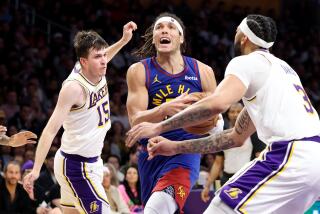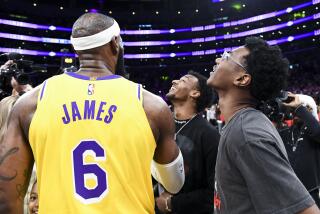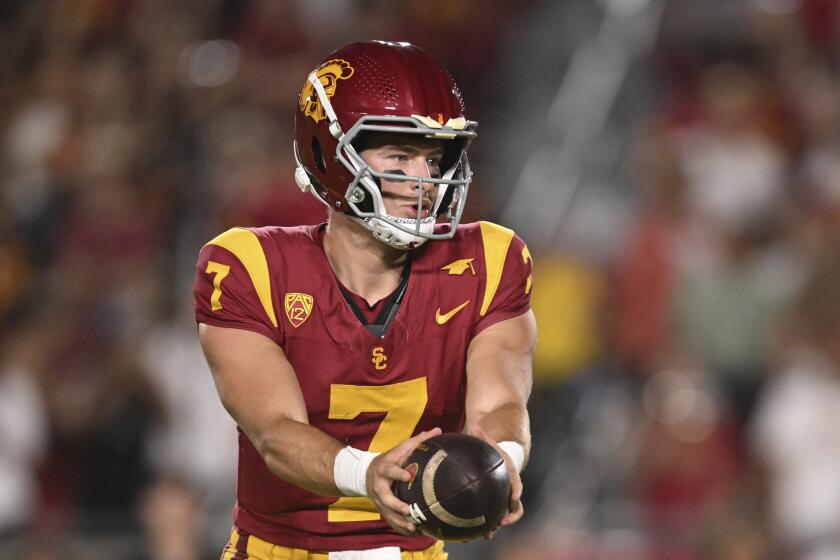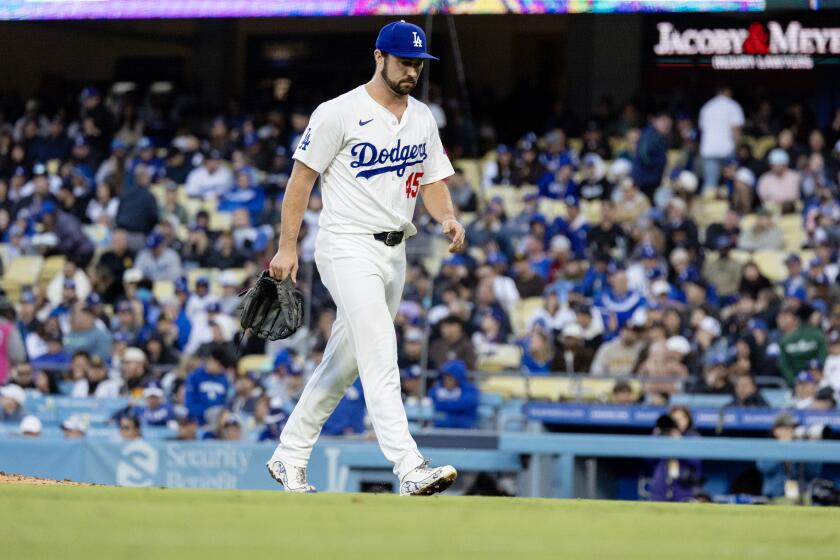Colts, Rams Identical
There are three identical reasons for the 1999 achievements of the 11-2 Indianapolis Colts and the 11-2 St. Louis Rams:
3. Because both teams lost so often for so many years, accumulating barrels of draft choices, they’ve both had so many shots in so many drafts that they couldn’t miss drafting a few great ones.
2. Each team has a solid head coach and first-class offensive coach: Jim Mora and Tom Moore of the Colts, Dick Vermeil and Mike Martz of the Rams.
1. Each has Hall of Fame talent at quarterback as well as at running back: Peyton Manning and Edgerrin James of the Colts, Kurt Warner and Marshall Faulk of the Rams.
Perhaps the most significant single explanation for their success is that Moore and Martz both coach interactive, two-threat football--on nearly every play, their opponents have a pass and a run to worry about.
You can always stop Manning, but not Manning and James--or Warner and Faulk.
Seven Years of Co-Threats
The coach who made two-threat strategy a necessity for those seeking NFL championships is Hall of Famer Bill Walsh. As the 1979-89 leader of the San Francisco 49ers, Walsh showed that passing is the way to go in pro football if you also make it a point to run the ball.
He believed so strongly in co-threats that to win his first Super Bowl with a Hall of Fame quarterback, Joe Montana, Walsh called running plays half the time when he didn’t have one good running back to his name.
You couldn’t do it that way now.
You need greatness now, or at least excellence, at running back.
Every Super Bowl champion of the last seven years has been a passing team for which a ballcarrier provided a steady second threat.
The roll: Emmitt Smith in Dallas with Troy Aikman, Ricky Watters in San Francisco with Steve Young, Dorsey Levens in Green Bay with Brett Favre, Terrell Davis in Denver with John Elway.
The Colts Had It Tougher
This year’s conspicuous two-threat winners, the Colts and Rams, won in identical ways Sunday.
As Indianapolis held off New England, 20-15, Manning passed for 186 yards and two touchdowns when the Patriots were looking for James, who ran 20 times for 101 yards when the Patriots were looking for Manning.
As St. Louis turned back New Orleans, 30-14, the interactive threats were passer Warner with 346 yards and two touchdowns and runner Faulk with 154 and two TDs.
As usual, it was aggressive offense that put the Colts and Rams ahead in the first half when, respectively, they led 14-6 and 24-14. But it was easier for the Rams to take charge of their game than it was for the Colts, who faced a team with players as talented as their own.
The Patriots, indeed, would have won the game if, on three or four plays, they’d made the right pre-snap guess on whom to hit, James or Manning.
Bucs Take King Over Dilfer
Of the other powers who won and lost Sunday, the Green Bay Packers lost a 33-31 game because, with injured runner Dorsey Levens out, they could only threaten Carolina with a passer, Brett Favre.
And in the fight for first in the NFC Central, the Tampa Bay Buccaneers could overcome Detroit, 23-16, because they’re now a team with three threats: rookie passer Shaun King, and runners Warrick Dunn and Mike Alstott.
Although Tampa Bay and Detroit have both been essentially defensive teams with conservative offenses, both came out passing with what had to be the certain knowledge that against good 1999 opponents, aggressiveness is the only way to go.
The Buccaneers’ play-caller, Mike Shula, attacked more aggressively with young passer King than he used to with veteran Trent Dilfer, who is now injured. With King and their great defense, the Buccaneers are suddenly a complete team that, surely, can threaten the high-flying Rams in the playoffs.
Numerous Short-Pass Plays Available
Tampa Bay’s weakness is its cast of mediocre wide receivers--they are what hurt Dilfer the most--but King showed what you can do when that’s all you have, throwing to eight different Buccaneers for 297 yards.
Although he’d rather throw bombs, King’s short-pass game was the more powerful, particularly when involving Dunn or Alstott.
They’re a unique pair of running backs, Dunn and Alstott, each of them effective on runs from scrimmage, but each more productive on short-pass plays--which in the Detroit game, almost every time gave both a head start unencumbered by the heavy scrimmage traffic induced by a good defense.
If the downside for Tampa Bay is a lack of quality receivers, one upside is that there are more kinds of short-pass plays in football than anything else for such as Dunn and Alstott.
There are screens, fast screens, quick outs, circle patterns, fast comebackers, dump-offs, and many others.
Offensive coordinator Shula can be expected to make the most of them.
Shotgun Plays Lack Ground Threat
One thing the Buccaneers could usefully forsake is the shotgun formation, in which quarterbacks stand far back of center.
All NFL teams, in fact, call too many shotgun plays.
The shotgun is a passing formation, which is the wrong platform for running plays because shotgun runs take too long to develop.
An occasional big run doesn’t change the reality that it’s harder to get a run-pass co-threat in the shotgun than in a conventional formation.
All this is particularly true at Tampa Bay, where, on any play up to third and 10, the Buccaneers are now the most dangerous with King under center handing off or faking to Dunn or Alstott.
Either of them is capable of a quick 10-yard run any time the defense is rushing the passer.
King, like any other quarterback, prefers the shotgun. But the truth is, like all the others, he can be more successful with a running-play threat.
Redskins Have What It Takes
In their next start, in the game of the week, the Washington Redskins will show they have the kind of team that can slow down the Indianapolis Colts.
Or so they’re saying now in Washington.
Like the Colts with Manning and James, the Redskins put on constant two-threat pressure with passer Brad Johnson and runner Stephen Davis--as they did Sunday to overwhelm Arizona, 28-3.
In Davis’ first four NFL seasons, he was nowhere heard from until Johnson came over from Minnesota this year to give Washington a pass threat.
With that, Davis has jumped all the way to first in NFL yards gained.
For reasons that are difficult for anyone to understand, the Redskins in recent years hadn’t been a successful passing team with Gus Frerotte, the passer who has made Detroit a contender this year.
Johnson has changed all that.
His offensive linemen would rather run, but they might remember that they were 6-10 running the ball last year--with Davis, but without Johnson.
Selected short subjects:
The New York Giants are suddenly back in the NFC Eastern race--tied for second with Dallas, one game behind Washington--as a consequence of the rebirth of quarterback Kerry Collins.
Proving that there’s nothing like experience to make a quarterback, Carolina’s Steve Beuerlein is having his best year in his 13th NFL season, validating the judgment of 1940s Hall of Fame quarterback Sammy Baugh, who says: “There’s no sport in the world nearly so involved as football. Automatically, just by living, a quarterback gets better every year. My best season in football was my 15th. My three best were my 13th, 14th and 15th.”
Football is so involved these days that a one-yard mistake beat Green Bay Sunday when, on third and 15, wide receiver Corey Bradford ran a 14-yard pass pattern, requiring the Packers to punt on fourth and one. It was the kind of mistake that a gifted second-year pro shouldn’t have been making--but on this year’s Packers, it’s the kind of mistake that quarterback Favre can’t quite overcome. Most NFL coaches talk repeatedly about turnovers--but turnovers are a fact of life. The errors that can and should by now have been corrected on teams like Green Bay’s are those like Bradford’s.
As inept as the New England Patriots can sometimes look with all their talent, they probably would have beaten the Colts Sunday on a neutral field. It was the unsportsmanlike noise raised by the partisan hometown crowd--whenever the Patriots had the ball--that made it impossible for them to beat a good team. When is the NFL going to step in and level the field?
More to Read
Get our high school sports newsletter
Prep Rally is devoted to the SoCal high school sports experience, bringing you scores, stories and a behind-the-scenes look at what makes prep sports so popular.
You may occasionally receive promotional content from the Los Angeles Times.






